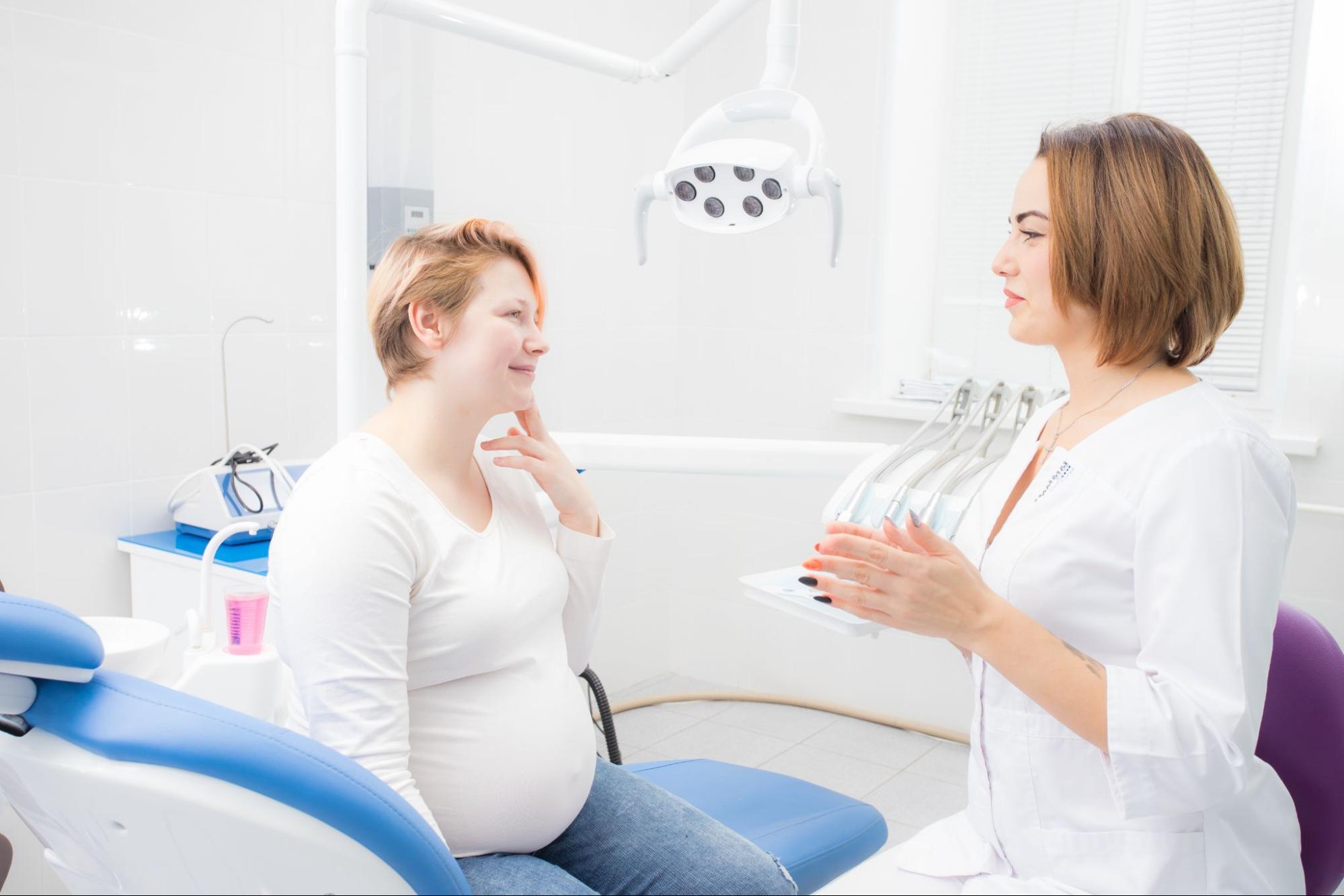Dental Care Tips Before, During, and After Pregnancy

Motherhood is a remarkable journey filled with joy and anticipation, from the minute you discover you’re expecting to the day you welcome your little one into the world. Throughout this transformative experience, it’s essential to focus more on your health—whether it’s physical, emotional, or oral. The privilege of nurturing a growing life within your womb demands extra attention to your well-being. If you’re preparing for pregnancy or already expecting and concerned about your dental health, you’ve come to the right place. Our comprehensive guide on dental care during pregnancy is here to offer support and guidance, providing valuable tips to help you maintain optimal oral health at every stage of your pregnancy.
Dental Health and Its Impact on Pregnancy
Dental health refers to the condition of your teeth, gums, and the surrounding oral tissues. It encompasses various aspects, such as maintaining oral hygiene, preventing dental diseases, and addressing any oral health issues that may arise. While dental health is important for overall well-being at any time, it becomes more so during pregnancy.
Pregnancy poses a higher risk of dental problems for women due to changes in their bodies, particularly the immune systems. Being pregnant puts your body in an immunocompromised state, meaning your ability to fight infections is lower. This adaptation is necessary to protect both the mother and the developing baby. During the first trimester, your body is adjusting to accept the foetus as a foreign presence to reduce the risk of rejection. However, this also makes you more susceptible to infections, diseases, and illness. It’s important to note that pregnancy itself does not directly cause oral problems. If you had poor oral hygiene or unknown dental issues before getting pregnant, the condition of your teeth and gums may deteriorate more rapidly during pregnancy. This is because any preexisting issues are now at a higher risk of escalating because of the changes in your body and the compromised immune system.
Pregnancy can also make your gums more reactive to any preexisting gum infections. If you had a gum infection before pregnancy, it is likely to progress more quickly to a moderate or severe stage. It is common for pregnant women to experience inflamed, red, and easily bleeding gums. However, it is essential to understand that these symptoms are not normal and should not be ignored. Women who had healthy gums before pregnancy can usually maintain their gum health during pregnancy without significant changes.
The key to minimising the risk of dental problems during pregnancy is to maintain good oral health before, during, and after pregnancy. This helps ensure you’re at lower risk of developing dental problems and have healthier pregnancy for overall well being for both you and your baby.
Dental Care for Pregnant Women
Pregnancy cannot cause dental problems. But because of the changes in a woman’s body, it’s vital to take even more care of your dental health during pregnancy. Here are some of the things you can do to maintain your oral health before, during and after pregnancy:
Dental Care Before Pregnancy
Ideally, before getting pregnant get your teeth and gums checked by a dentist. This helps the dentist check for any potential oral issues and treat them before pregnancy. Plaque buildup and bacteria can be professionally cleaned to minimise the risk of developing cavities or gum infections. Having healthy teeth and gums, you will have much fewer or no problems during pregnancy.
If for some reason, because of time constraints or not getting the chance to get a checkup done before pregnancy, you can also get one done as soon as you find out you’re expecting. It will also allow you to get guidance for oral care during pregnancy, personalised product recommendations, and address any concerns you may have to help you through the following months.
Dental Care During Pregnancy
There are very few dental treatments that cannot be done for pregnant women. It’s even more important that pregnant women receive the care they need because this is a high-risk period and any untreated problems can worsen at a faster pace.
A common problem that’s made worse during pregnancy is gum infection. Hormonal changes may aggravate the gums, causing inflammation and bleeding. Your dentist can help clean the teeth to prevent the infection from spreading, and you can maintain your teeth and gums with daily brushing, cleaning between the teeth with interdental brushes or flossing, recommended mouthwashes, and saltwater rinses.
Local anaesthesia and X-rays can both be taken during pregnancy without adverse effects. This is because with modern digital x rays, the radiation dose is extremely low. In fact, a flight from melbourne to sydney is equivalent to about 4 intraoral dental x-rays in radiation. Your dentist will also take the relevant precautions, such as placing a lead apron over your belly before the X-ray. Not getting treatment for cavities or gum infections can put you and your baby’s health at risk, as such problems can escalate very quickly. In fact, it has been shown that severe gum disease during pregnancy is correlated to premature birth or low birth weight.
Another problem pregnant women may experience is tooth damage because of vomiting. The acid from the vomit can damage the tooth enamel, making it thinner and more sensitive. While most women may not have vomiting after the first trimester, quite a few experience this throughout pregnancy. There’s not much you can do about the vomiting, but you can protect your tooth enamel. A good tip is not to brush your teeth after vomiting as your teeth enamel is softer. Brushing will wear the enamel even more. It’s better to rinse with plain water. Alternatively, you can even use bicarbonate soda. Just dissolve it in warm water, swish it around the mouth and rinse to neutralise the leftover acid in your mouth. Do not try to brush with bicarb soda as it is too abrasive.
Dental Care After Pregnancy
Once you’ve given birth, your body is slowly recovering and adjusting to the changes during pregnancy. At this stage, women generally eat more frequently because they may be breastfeeding. This can increase the incidence of dental decay because the teeth don’t get rest from having food in the mouth. When we eat, the environment in the mouth becomes acidic, and it takes 20 to 30 minutes to neutralise. Frequent snacking, even small meals, exposes your teeth to a constant acidic environment, making them more prone to dental decay. It’s advisable to stick to 3 to 5 meals a day, during the last trimester when you may be experiencing cravings and after birth when you may feel hungrier.
In addition, dental checkups and any changes in your teeth and gums which may persist, such as gum inflammation or sensitive teeth, should be discussed with your dentist. We understand motherhood, especially in the beginning, can be busy and stressful. But this does not mean you forget or delay your dental or overall health.
Common Dental Problems During Pregnancy
As mentioned above, pregnancy is not the cause of dental problems, but it can increase the risk of developing oral issues because of poor oral health or hygiene before or during pregnancy. This can be mitigated by maintaining your dental health and hygiene. Some of the common dental problems during pregnancy include:
Pregnancy Gingivitis
Hormonal changes during pregnancy can make gums more susceptible to inflammation and infection, leading to pregnancy gingivitis. Symptoms include red, swollen and tender gums and bleeding during brushing or flossing. If left untreated, gingivitis can progress to a more severe form of gum disease called periodontitis. It is vital to address and manage gingivitis during pregnancy to prevent potential complications.
Increased Risk of Tooth Decay
Pregnancy can increase the risk of tooth decay due to changes in eating habits and hormonal fluctuations. Cravings for sugary or acidic foods, and morning sickness that leads to frequent vomiting can expose the teeth to higher levels of acids and sugars. The acid attack weakens the tooth enamel and makes it more susceptible to decay.
Pregnancy Tumours
Some pregnant women may develop noncancerous growths known as pregnancy tumours or pyogenic granulomas. These small, red, or purple swellings can appear on the gums and bleed easily. While they are not harmful or cancerous, they can be uncomfortable. Dentists can evaluate and provide appropriate treatment if necessary.
Tips and Preventive Measures Before, During and After Pregnancy
Some tips to help you maintain your oral health before, during and after pregnancy include:
- Schedule a dental checkup before pregnancy or as soon as you find out you are pregnant.
- Maintain a consistent oral hygiene routine, including brushing twice daily and cleaning between the teeth with interdental brushes and flossing.
- Eat a balanced diet rich in vitamins and minerals and limit sugary food and drinks.
- Limit frequent snacking to prevent decay and cavities.
- Avoid tobacco and alcohol and stay hydrated with high water intake.
- Rinse the mouth with water or bicarbonate mixture to neutralise acid after vomiting and if you want to brush, wait at least 30 minutes before doing so. .
- Attend regular dental checkups and cleanings throughout your pregnancy.
- Discuss any concerns or symptoms with your dentist and obstetrician.
- Inform your dentist about your pregnancy to ensure appropriate treatment and medications.
A Healthy Family Begins with a Healthy Mother
At Whitehorse Dental, we offer quality dental care for the entire family. With a focus on preventive care to prevent future dental problems and a proactive approach to help our patients treat reactive oral issues, we’re your oral health partners for life. Whether you’re an expecting mother or a new one, our gentle Blackburn dentists always take the time to listen to and understand your concerns with friendly support, guidance, and bespoke dental treatments. Book a consultation today.

